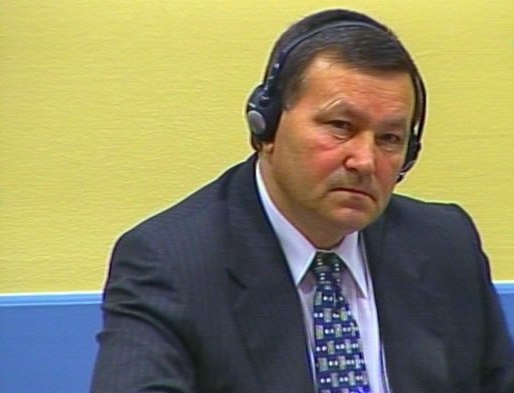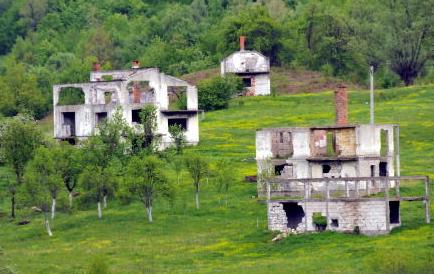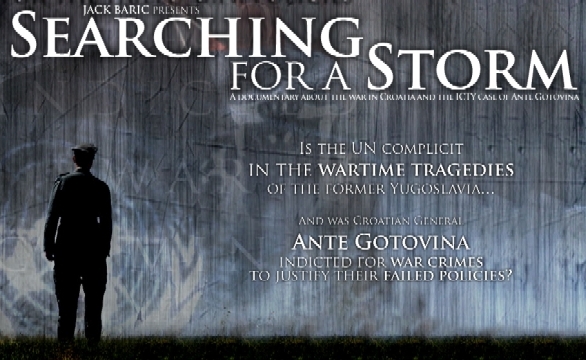 The ICTY convicted Ante Gotovina (right corner) and sentenced him to 24 years. Mladen Markač (left) was also convicted and sentenced to 18 years’ imprisonment. A third general, Ivan Čermak (below), was acquitted.
The ICTY convicted Ante Gotovina (right corner) and sentenced him to 24 years. Mladen Markač (left) was also convicted and sentenced to 18 years’ imprisonment. A third general, Ivan Čermak (below), was acquitted.
Two sentenced, one acquitted
Ante Gotovina and Mladen Markač were found guilty of having participated in a joint criminal enterprise during and after the military “Operation Storm,” carried out from August to November 1995 with the aim of forcibly and permanently removing the ethnic Serb population from the Krajina region of Croatia.
“This judgement is the first step to truth and justice for many victims of crimes committed during ‘Operation Storm’ in Croatia in 1995,” said Nicola Duckworth, director of Amnesty International‘s Europe and Central Asia Programme.
“It shows that even the most high-level perpetrators of crimes under international law cannot evade justice.”
1995 military operation’s crimes
According to the indictment, crimes against humanity were committed during the 1995 military operation, including persecutions, deportation, murder and inhumane acts. The charges also included war crimes, such as unlawful destruction of civilian property.
In a recent report, “Behind a Wall of Silence: prosecution of war crimes in Croatia”, Amnesty International documented how justice in Croatia is slow and selective more than 15 years after the war ended, and how a lack of political will to deal with the wartime past prevents many victims from receiving justice, discovering the truth and obtaining reparation.
Prosecution too slow
Only 18 cases are resolved on average each year, adding to a backlog of more than 500 cases. At the current rate of prosecution, some victims of alleged war crimes and crimes against humanity would need to wait another 30 years to see justice.
High-level Croatian political figures – including current Deputy  Speaker of the Croatian Parliament Vladimir Šeks – have yet to face investigation. Prosecutions target mostly Croatian Serbs and other minorities whereas crimes committed by the Croatian Army and police forces go unpunished.
Speaker of the Croatian Parliament Vladimir Šeks – have yet to face investigation. Prosecutions target mostly Croatian Serbs and other minorities whereas crimes committed by the Croatian Army and police forces go unpunished.
Local courts lack witness support and protection measures. The well-known case of the August 2000 killing of Milan Levar, a potential ICTY witness remains unresolved.
“The international community must demand that Croatia investigates and prosecutes its backlog of hundreds of cases to give victims access to justice, truth and reparation,” said Nicola Duckworth.
“Justice must be sought – and delivered – for Croatia’s war victims.”
Inadequate legal framework
Only a very limited number of low-level perpetrators have been brought to justice in Croatia for crimes committed during Operation Storm.
Despite consistent international criticism, and the progress that has been made in some areas, the Croatian authorities have failed to develop the capacity of the justice system to effectively prosecute war crimes cases.
failed to develop the capacity of the justice system to effectively prosecute war crimes cases.
Complicated legal procedures and their application by the courts prevent victims of war crimes and their families from accessing reparations for human rights violations they experienced during the war.
Amnesty International’s 2010 research shows that the legal framework itself in Croatia is inadequate for prosecution of war crimes cases. This is because it fails to define in accordance with current international standards the crucial concepts related to prosecution of crimes under international law such as command responsibility, war crimes of sexual violence and crimes against humanity.
Amnesty International is therefore concerned that the application of the current Croatian legal framework may result in impunity for many crimes committed during the 1991-1995 war.
Wall of silence
“The biggest problem is gathering personal evidence – which means witnesses.
We had a situation here that during the police investigation everybody remembered everything, everybody was making allegations. However, when we brought the same people – preliminary witnesses – in front of an investigative judge to confirm what they said so that it could become evidence….everybody has suddenly forgotten everything… No one could remember anything anymore…A wall of silence…. I do not need to explain any more I guess…
we brought the same people – preliminary witnesses – in front of an investigative judge to confirm what they said so that it could become evidence….everybody has suddenly forgotten everything… No one could remember anything anymore…A wall of silence…. I do not need to explain any more I guess…
Whether they are being threatened? I do not want to speculate about it…”, said Deputy Chief State Prosecutor, interviewed by Amnesty International in February 2008.
Related articles:
Croatia: ongoing impunity for war crimes
Documenta publishes a report on the monitoring of war crime trials in Croatia





